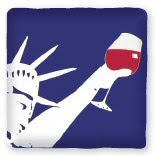Drinking Alsatian at San Francisco Wine School
 On Tuesday last week, I dropped in on the first (ever) session of the newly minted San Francisco Wine School. Their introductory course was France. I had previously announced the opening of the school on this blog (see here), but wanted to check for myself what it'd be like, before I really stuck my neck out and put the Iron Chevsky seal of approval on these guys.
On Tuesday last week, I dropped in on the first (ever) session of the newly minted San Francisco Wine School. Their introductory course was France. I had previously announced the opening of the school on this blog (see here), but wanted to check for myself what it'd be like, before I really stuck my neck out and put the Iron Chevsky seal of approval on these guys.On the second floor of a swanky'ish old Hotel Triton in the super-happening downtown area close to the Union Square, I walked into a cozy room with a small group of students, and two wine Jedi presiding. One of them - Maureen Downey, specializes in managing wine collections and wine auctions (her copious credentials can be seen here.) The other - David Glancy is a Master Sommelier and a long-time educator and department chair in the Professional Culinary Institute in Campbell, CA. Both were incredibly knowledgeable.
 The first class focused on Alsace, a region that is supposed to be the easiest to understand in France, because it has the fewest appellations and complications. Personally, I've always skirted Alsace without ever getting deep into it. An occasional masterpiece Riesling (Cuvée Ste. Catherine, $40-60, in particular) from Weinbach has kept Alsace alive for me, but otherwise it's been a bit of a food pairing puzzle. (Perhaps I should eat more sauerkraut?!) Maureen led the class with tons of extra-curricular knowledge and splashes of humor. David poured some interesting wines, which confirmed to me that taste-wise it is not an easy region to figure out, but that their Rieslings (I really enjoyed Albert Boxler Grand Cru Sommerberg 2004, $50-60) can indeed be very very good, and have a different (somehow more "grown-up" ?) aspect to them than German Rieslings. More alcohol than Germans? Drier? Something different and worth exploring. Personally, I stay away from the sweet and bubbly versions of anything Alsatian. The reds can get geeks excited, especially over a pastrami sandwich. The Pinot Noir we tried (Remy Gresser Brandhof, 2008) reminded me of a cross between Frappato (fruity, medium-bodied red from Sicily) and Beaujolais.
The first class focused on Alsace, a region that is supposed to be the easiest to understand in France, because it has the fewest appellations and complications. Personally, I've always skirted Alsace without ever getting deep into it. An occasional masterpiece Riesling (Cuvée Ste. Catherine, $40-60, in particular) from Weinbach has kept Alsace alive for me, but otherwise it's been a bit of a food pairing puzzle. (Perhaps I should eat more sauerkraut?!) Maureen led the class with tons of extra-curricular knowledge and splashes of humor. David poured some interesting wines, which confirmed to me that taste-wise it is not an easy region to figure out, but that their Rieslings (I really enjoyed Albert Boxler Grand Cru Sommerberg 2004, $50-60) can indeed be very very good, and have a different (somehow more "grown-up" ?) aspect to them than German Rieslings. More alcohol than Germans? Drier? Something different and worth exploring. Personally, I stay away from the sweet and bubbly versions of anything Alsatian. The reds can get geeks excited, especially over a pastrami sandwich. The Pinot Noir we tried (Remy Gresser Brandhof, 2008) reminded me of a cross between Frappato (fruity, medium-bodied red from Sicily) and Beaujolais.I asked David about the $895 price tag for the course - certainly not chump change. He pointed out that a course at PCI where he teaches is almost $9000, and those classes are filled.
Because this group of students were all serious about wine, the class got deep quick. I appreciated David's ability as an experienced Master Sommelier to offer very original and insightful food pairing suggestions for the various wines. I could see that the instructors easily managed to span topics suitable for both wine newbies and experienced wine professionals. I can say with confidence that if you are serious about understanding French wine, this class is for you. The next go-around will start in January 2011. For schedule details and contact info, click here. Voila!



Comments